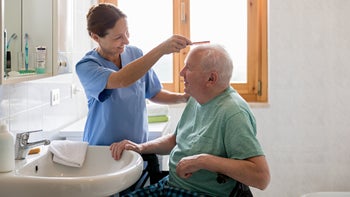
13 Causes of Frequent Urination and How to Treat It
Key takeaways:
The number of times you pee throughout the day varies. But if you notice a change in how often you pee, or if you need to pee more than six times a day, you may have urinary frequency.
Urinary frequency is not just a normal part of aging. There’s usually a source for your symptoms, and a healthcare professional can help you figure it out.
There’s treatment for most causes of urinary frequency, but the first step is to pinpoint the specific cause.
Table of contents

If you have to urinate a lot, you know that it can get in the way of your day-to-day activities. Getting up to run to the bathroom during a meeting can be annoying. But frequent urination can also cause larger disruptions. You may lose sleep at night if you’re constantly waking up to urinate.
Frequent urination may also be a sign of a serious medical condition, so don’t write it off as just getting older. Evaluating your symptoms can help you figure out why you’re peeing so much and get you on the path to treating it.
Let’s take a closer look at 13 reasons why people may have frequent urination.
Save up to 60% on Farxiga
Healthy heart for less. Pay as little as $288 for 30 tablets of Farxiga with GoodRx - no insurance needed.

1. Urinary tract infection (UTI)
A urinary tract infection (UTI) can cause the constant feeling of having to pee. A UTI happens when there’s an infection in the organs of your urinary tract. UTIs are common. In fact, up to 60% of women report having a UTI at some point in their lifetime.
Besides frequent urination, other symptoms of a UTI include:
Blood in the urine, cloudy urine, or a strong odor to the urine
Burning with urination
Lower belly pain
Fever
Back pain
Having to pee urgently, sometimes with very little urine
Nausea or vomiting
Treatment for a UTI includes antibiotics and medications to help with pain and fever.
Is my medication causing me to pee too often? Some medications can increase your urinary frequency. Find out which medications can make you pee more as a side effect.
Overactive bladder medication: If you’re looking for overactive bladder treatment, there are many different types of medications you can try.
Wondering if your bladder habits are normal? Learn more about just how often you should pee each day.
2. Diabetes
Diabetes is a common cause of frequent urination. In this condition, your body either doesn’t make enough insulin or can’t use the insulin it has. This can lead to increased blood glucose (blood sugar) levels and serious complications for your kidneys and other organs.
Your kidneys have many jobs. This includes helping to:
Remove toxins from the bloodstream through urine
Control blood pressure
Make blood cells
Keep bones healthy and strong
Balance fluids in the body
When your blood sugar levels are high, your kidneys work hard to remove the extra sugar from your bloodstream. This can cause you to make more urine and have to pee more often. Over time, diabetes can lead to damage in the blood vessels that keep the kidneys healthy. About 1 in 3 adults with diabetes has chronic kidney disease.
In addition to peeing often, other signs of untreated diabetes may be:
Increased thirst
Hunger
Blurry vision
Fatigue
Weight loss
3. Pregnancy
Frequent urination is common in pregnancy. In early pregnancy, hormonal changes can give you the urge to pee more often. Urinary frequency can be one of the earliest signs of pregnancy. Other signs of pregnancy can include:
Missed period
Vaginal spotting
Nausea and vomiting
Breast tenderness and swelling
Fatigue
Headaches
You may also have frequent urination in later stages of pregnancy. That’s because the growing uterus can put pressure on your bladder. While pregnant, you’re also at an increased risk of developing a UTI. Sometimes this may be another reason for urinary frequency in pregnancy.
4. Appendicitis
An inflamed appendix from appendicitis may lead you to pee more often. Appendicitis is a common surgical emergency. In fact, it’s the most common reason people have surgery on their abdomen. Appendicitis happens when stool and other debris gets trapped in the appendix, causing it to swell.
Because of the location of the appendix, swelling of it can irritate your ureter or bladder. This can cause you to have urinary frequency. Some common symptoms of appendicitis are:
Right lower belly pain
Nausea or vomiting
Loss of appetite
Fever
Constipation
In severe cases, the appendix can rupture and lead to a serious infection in the belly. That’s why appendicitis most often requires surgery for treatment. So it’s important to recognize the signs early. If you’re concerned that you may have appendicitis, get medical attention right away.
5. Medication
The medications you take can sometimes be the cause of your frequent urination. Some of the more common ones include:
Diuretics like hydrochlorothiazide, furosemide, and spironolactone
Calcium channel blockers like amlodipine and diltiazem
Beta blockers like metoprolol and carvedilol
Mood stabilizers like lithium
SGLT2 inhibitors for diabetes like Farxiga and Jardiance
If you start a new medication and notice that you have to pee more, let your medical professional know.
6. Drinking too much
What you drink can cause you to pee more often. If you take in lots of water, you’ll likely notice that you urinate more. Alcoholic drinks and beverages with caffeine can also cause urinary frequency. This is commonly the issue if you’re urinating often at night.
If you find yourself peeing too much (especially at night) you can try to:
Decrease your fluid intake several hours before bedtime
Avoid caffeine after midday
Avoid alcoholic beverages
7. Constipation
Sometimes constipation causes urinary frequency. If you have fewer than three bowel movements in a week, you may have constipation. This can cause the rectum to swell with stool and push on the bladder. The enlarged rectum leaves less room for the bladder to fill and creates an urge to pee more often.
Constipation has many causes. These include:
Diet (like a lack of fiber or water)
Lack of exercise
Medications like opioids or antihistamines
Medical conditions like hypothyroidism
Pregnancy
Treatment for constipation depends on the cause. Your healthcare professional can help you figure out why you aren’t having many bowel movements. Sometimes increasing your water and fiber intake helps. In some cases, medications help. Common over-the-counter (OTC) medications for constipation are:
Suppositories like Bisacodyl
8. Fibroids
Uterine fibroids can also make you pee more often. These are growths that can happen either inside or on the outside of the uterus. Fibroids are common. In fact, half of women will develop fibroids by the age of 50.
Sometimes fibroids grow large. When this happens, the uterus can put pressure on the bladder and cause urinary frequency. Other symptoms of fibroids are:
Heavy or long-lasting periods
Irregular bleeding between periods
Pelvic pain or pressure
Pain with sex
Treatment for fibroids can range from medication to surgery. So, if you have any of these symptoms, let your healthcare professional know. If you have fibroids, they can create a treatment plan that works best for you.
9. Overactive bladder
An overactive bladder (OAB) can cause bladder spasms that lead to urinary frequency. This happens when the bladder muscle contracts suddenly, giving you the feeling that you have to pee urgently. This can lead to accidents if you aren’t able to make it to the bathroom in time.
OAB is common and affects about 12% of people. There’s a misconception that this is a normal part of aging. But OAB is actually a condition you can treat.
Some factors that may put you at risk for OAB include:
Nerve disorders that interrupt the signal between your brain and bladder
Hormonal changes
Pelvic floor weakness or spasms
UTI
Certain medications
Medical conditions that affect the brain (like stroke and multiple sclerosis)
If you are concerned about OAB, talk with your healthcare professional about getting checked for this condition.
10. Prostate enlargement
An enlarged prostate can make you pee a lot, often through the night. It’s commonly recognized as benign prostatic hyperplasia (BPH). The prostate is a gland that sits underneath the bladder in men, and it helps to make semen. This gland gets bigger as you age, and half of people who have a prostate develop BPH by age 60.
As the prostate enlarges, you can have trouble emptying your bladder completely. This can trigger urinary frequency.
Other symptoms of BPH are:
A strong urge to urinate
Difficulty when starting to urinate
A weak urine stream
Urinating many times at night
Painful urination
Pain after ejaculating
Not emptying the bladder after urinating
Passing urine unintentionally
If you have any of these symptoms, talk with a healthcare professional. They’ll need to evaluate you and figure out the cause of your urinary problems.
11. Cancer
Cancer anywhere in the urinary tract can cause urinary frequency. Bladder cancer is the fourth most common cancer in men. Symptoms of bladder cancer can include:
Hematuria (blood in the urine)
Dysuria (painful urination)
Back or flank pain
Swollen lymph nodes
Weight loss
Feeling a fullness or mass in the abdomen
If you have urinary frequency and notice blood in your urine or have any of these symptoms, you should talk with a healthcare professional immediately. You might have an easily treated UTI, but it could be something more serious. Either way, the earlier you get treatment, the better the outcome.
12. Kidney stones
Kidney stones (urinary calculi, urolithiasis, or nephrolithiasis) happen when crystals start to form anywhere along the urinary tract. If they irritate or partially block the bladder, they can make you feel like you need to urinate. Some of the other symptoms that happen with kidney stones are:
Pain
Nausea
Vomiting
Blood in the urine
Chills and fever
13. Pelvic organ prolapse
Risk factors like older age, being overweight, multiple vaginal births, and chronic straining (constipation) can weaken the supporting structures around the bladder. When the tissues are weakened enough, the vagina or uterus can collapse and put pressure on the bladder.
Compression of the bladder or urethra can make you feel like you have to pee frequently. Other symptoms of pelvic organ prolapse include:
Incontinence
Urinary retention
Urinary urgency
Pelvic organs bulging into the vaginal canal
Back pain
Feeling of pressure or fullness in the pelvis or vagina
Pain with sex (dyspareunia)
What causes frequent urination at night?
Frequent urination at night (nocturia) is a common occurrence. About 1 in 3 people older than 30 years wake up two or more times to urinate at night. Nocturia can disrupt sleep and affect your quality of life, so it’s important to find out what’s causing it and get treatment.
Any of the conditions that cause you to urinate frequently during the day, can also cause nocturia. The most common causes of nocturia include:
Drinking too much: Water, caffeine, or alcohol right before bedtime can cause you to pee at night.
Bathroom habits: You’ve trained your body to wake up to use the bathroom, even if you don't need to go.
Medications: Treatments like diuretics (water pills) and seizure medications can increase your nighttime urge to pee.
Sleep disorders: Conditions like insomnia or sleep apnea may cause you to get up at night to pee.
Overactive bladder: This condition can cause frequent urination throughout the day and night.
Treatments for frequent urination
Treatments for frequent urination depend on the cause. Once a healthcare professional has ruled out serious medical conditions and infections, treatment is focused on reducing the number of times you have to urinate during the day or night. Some of the treatment options include:
Behavior modification: This can include changing the timing of medications or reducing your fluid intake.
Bladder training: This involves waiting longer periods between bathroom visits.
Antimuscarinic medications: Medications like hyoscyamine (Levsin), solifenacin (Vesicare), and oxybutynin (Ditropan XL) reduce muscle contractions in the bladder.
Sacral neuromodulation or percutaneous tibial nerve stimulation: Minimally invasive surgery is used to implant a small device that delivers electrical current to stimulate nerves and relax the bladder.
Botulinum toxin (Botox): Botox is injected into the detrusor muscle, which relaxes the overactive bladder.
A healthcare professional can work with you to find the treatment option that gives you the best results to fit your goals and lifestyle.
The bottom line
Having to pee frequently can be alarming. And it can be disruptive when it causes you to lose sleep at night. If you notice that you have to run to the bathroom often, don’t assume it’s a normal part of aging. In most cases, urinary frequency is due to an underlying cause that you can treat. If you have urinary symptoms, be sure to talk to a healthcare professional for guidance.
Why trust our experts?


References
American Cancer Society. (2024). Key statistics for bladder cancer.
Armstrong, C. (2013). AUA releases guideline on diagnosis and treatment of overactive bladder. American Family Physician.
Centers for Disease Control and Prevention. (2024). Chronic kidney disease.
Delzell, E. J., et al. (2000). Urinary tract infections during pregnancy. American Family Physician.
Feloney, M. P., et al. (2024). Sacral neuromodulation. StatPearls.
Irwin, D., et al. (2006). Population-based survey of urinary incontinence, overactive bladder, and other lower urinary tract symptoms in five countries: Results of the EPIC study. European Urology.
Medina, M., et al. (2019). An introduction to the epidemiology and burden of urinary tract infections. Therapeutic Advances in Urology.
MedlinePlus. (2023). Urinating more at night.
MedlinePlus. (2022). Uterine fibroids.
Moris, D., et al. (2021). Diagnosis and management of acute appendicitis in adults: A review. JAMA.
National Institute of Diabetes and Digestive and Kidney Diseases. (2014). Prostate enlargement (benign prostatic hyperplasia).
National Institute of Child Health and Human Development. (2017). What are some common signs of pregnancy?
National Kidney Foundation. (n.d.). Diabetes and kidney disease stages 1-4.
Urology Care Foundation (n.d.). What is an overactive bladder?
Urology Care Foundation (2023). What is nocturia?
















